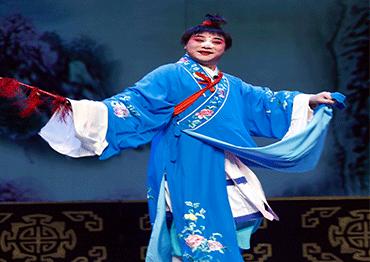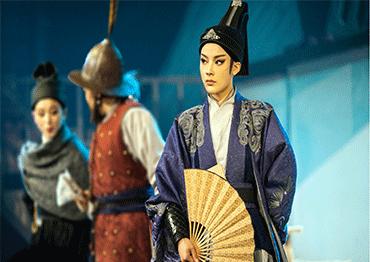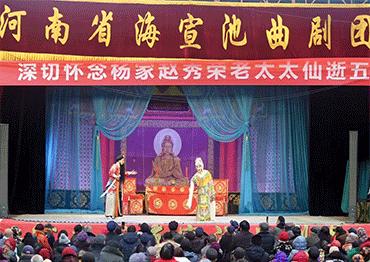Livestreaming platforms breathe new life into traditional Chinese operas by helping it reach more viewers, but for performers, it does not always mean success
Two hours before his curtain call, Jia Zixiang, a young Yu Opera actor from Zhengzhou, Henan Province, started his livestream by detailing the intricate process of applying his makeup, fixing his headdress and putting on his costume, recognizable as being Mu Guiying, a legendary female general in ancient China and a symbol of female empowerment and courage. He was about to perform a classic Yu Opera called Mu Guiying Takes Command.
Many of his viewers saw for the first time how a male performer prepares for a female role. “Isn’t it heavy wearing the phoenix headdress?” “Does your head hurt?” they questioned.
Livestreaming has become an inseparable part of the 27-year-old performer’s life. If there’s no performance, he broadcasts almost every afternoon at 2 pm, at home or in nearby parks, even on his birthday. He prepares scenes from operas or sings if he gets requests. Jia has nearly 500,000 followers on his Douyin (TikTok) account. His livestreams contribute half of his income and supplement his live performances, though he would not reveal how much he gets.
In China, gigging at different venues is usually the main source of income for regional opera troupes and performers. But as the opera market declines, more opera actors like Jia have turned to live broadcasting as a lifesaver, particularly after the Covid-19 pandemic saw performances suspended for long periods.
The art form, once considered moribund as China opened to different cultures, is seeing a second act due to the accessibility of short-video platforms and the increasing recognition of the need to preserve the country’s heritage and traditional culture. The government’s efforts to broaden awareness, including promoting artistic performances to university students, has drawn more followers to opera culture online.
While solving their own problems, these broadcasters help promote traditional culture by introducing it to a wider audience. Meanwhile, they are luring more and more young Chinese to traditional art forms, which they previously shunned.

Jia Zixiang livestreams his preparation process for a female role,or nandan

Zhou Shaojun performs in the Yu Opera Rolling Tube (Photo Courtesy of Zhou Shaojun)
New Stage
Jia, 27, was already a veteran livestreamer, starting out in 2017 after he learned Yu Opera, a major regional opera style on par with Peking Opera and Yue Opera. Yu Opera originated in Henan Province, and is popular in China’s central and eastern regions. Studying fine art at college when he became interested in Yu Opera, he was encouraged by his operaloving mom to begin studying nandan, or female roles played by men.
Since he has not joined a professional troupe, his performing opportunities are irregular, but he has worked hard to build up his livestream fan base. His reputation and celebrity garners him tips from viewers, and he also sells products online. Others are not so lucky.
“I know many opera performers who couldn’t make ends meet during the pandemic years and had to work as a delivery driver or in an electronics factory,” Jia said.
His online popularity brings more opportunities offline, and he earns a higherthan-average income, he said. Some of his online fans travel from far away to see him perform in person.
Ren Yuanyuan and Ren Dandan, twin sisters from Zibo, Shandong Province, started studying Peking Opera when they were 10, and both got places to study it at the National Academy of Chinese Theater Arts. But after graduation, they shied away from the traditional path, believing it would be hard to stand out in a troupe. Supporting themselves by teaching opera or acting in plays, in March 2023, they experimented with a livestream performance, and when it proved a success, decided to continue.
The sisters have developed a “schtick” where they do each other’s makeup, tell backstories about operas and banter with fans. The viewership rose, and so did their tips. By January 2024, they had more than 100,000 followers.
They realized they could use these tips, known as dashang in Chinese, to supt them in getting back to a more purist vision of Peking Opera.
Dashang, tipping small amounts to recognize a service or performance, was in the past an important way for opera actors to earn a living and feel validated for their efforts.
“We can’t ask everyone who watches us to pay. It’s not realistic. But we hope some viewers, if they are moved, can give us a reward to encourage us,” Ren Dandan told NewsChina.
For these actors, the significance of dashang lies not just in increased earnings. It shows people’s appreciation and respect for their efforts. It bolsters their sense of pride in the profession and pushes them to improve their skills, several interviewed opera livestreamers said.
Liu Shuhan, who performs Peking Opera as well as Kun Opera, one of the oldest forms of Chinese opera originating in Kunshan, Jiangsu Province in the early Ming Dynasty (1368-1644), told NewsChina that many classmates and colleagues her age had to find other jobs in the past. “The market was stagnant and incomes were low. It was really hard to keep going,” she said. In recent years, along with the popularity of livestreaming, young opera actors have a broader stage and a new source of income. “More actors choose to persist. And many are coming back to the trade,” Liu said.
A large number of grass-roots opera actors, opera enthusiasts, retired actors or people who left the stage, have found new audiences on video platforms like Douyin and Kuaishou.
Livestreaming is also helping opera troupes, private or State-backed, who are struggling in a declining market, particularly after the Covid-19 outbreak.
Zhou Shaojun, director of Haixuanchi Qu Opera Troupe, which performs Qu Opera, another variation from Henan Province, told NewsChina that they spent over 1 million yuan (US$141,900) rehearsing a new piece right before the Covid-19 breakout. All their booked performances were canceled. Based in Pingdingshan in Henan, Zhou decided to try live opera broadcasts in 2020 after the troupe’s income nosedived so he could pay his performers and reduce his debts. The troupe raised more than 20,000 yuan (US$2,787) in the form of dashang in the first month. Even when offline performances resumed, the troupe continued livestreaming, which has become an important means of promotion. Before 2020, there were over 2,000 private opera troupes in Henan, but only a few hundred remain, Wang Quanzhen, a renowned Yu Opera actress and vice president of the Henan Opera Association, said at an event held by Douyin in Luoyang, Henan Province in May 2023. She noted that livestreaming provides new opportunities, new audiences and new sources of income for Yu Opera.
Platforms like Douyin and Kuaishou have supported opera livestreamers, which are new channels for them to young fans are very interested in opera culture.
Jia told NewsChina that he was once invited to a kindergarten because the children were curious about opera. “It was a good opportunity for the kids to learn about the traditional art and develop an interest,” Jia said.
“The majority of viewers on my channel are between 25 and 45,” Jia said. Many are in their 20s or even teenagers. “It’s not that they’re not interested. They just need a chance to engage with traditional art,” Jia said.
On Douyin, many young users comment on opera videos that while expressing their appreciation, point out they have few opportunities to see one in real life.
“Our ancestors’ aesthetic tastes are never out of date,” a Douyin commenter posted.
New Dragon Gate Inn, an innovative wuxia (martial arts) Yue Opera – also known as Shaoxing Opera, a genre popular in Jiangsu and Zhejiang provinces and Shanghai – performed by the Hangzhoubased all-female Xiaobaihua Troupe, was viewed 9.25 million times when it first livestreamed on Douyin in August 2023. It was an online sensation, helped by young people sharing clips, triggering an interest in Yue opera. Tickets for their live performances are hard to come by.
Many lauded the actresses for their extraordinary portrayal of male characters, especially Chen Lijun, whose captivating performances have garnered significant admiration from fans. Some have even said they would give up watching TV dramas for Yue Opera.
“Now I’ve grown from questioning my grandma [for loving opera], to understanding my grandma, to becoming and surpassing my grandma,” a netizen commented on one of Chen Lijun’s Douyin videos. The years of hard work and diligence impress viewers and keep them wanting more.
In 2021, people born in the 1990s and 2000s accounted for over 50 percent of the total views for videos related to intangible cultural heritage operas on Douyin, according to a report the video platform released in 2021.

A stage scene from the Yue Opera New Dragon Gate Inn starring Chen Lijun

Zhou Shaojun’s Qu Opera troupe performs at a funeral in Zhoukou, Henan Province (Photos Courtesy of Zhou Shaojun)
Harsh Reality
Yet despite the newfound online popularity, it is hard to reverse the overall decline in the opera market, said several interviewed performers.
The 1980s and 90s was a golden time for opera, when troupes rushed between venues to perform multiple times a day. Interest started to wane in the late 1990s as new forms of entertainment, such as TV and movies, became more accessible. Now, few people in rural areas want to book an opera show for important events like weddings, births and funerals.
Meanwhile, ever fewer people choose to learn the art, which requires years of hard training not just in singing, but also in martial arts, acrobatics, sword fighting and other skills such as costume design and makeup. Despite the high level of skill, there are limited job opportunities. Some smaller regional opera styles struggle to attract young people to carry on the tradition.
A survey by the Ministry of Culture in 2015 shows there were 348 existing opera types in the Chinese mainland by August 2015, among which 107 opera types had no government-supported troupes and relied on private groups.
Zhou told NewsChina that his troupe has been performing for more than 20 years, and has around 50 performers who love Qu Opera and are willing to stay despite the meager income. “We’ll persist as long as we can. But after we get old and retire, the troupe will probably disband without anyone to follow us,” Zhou said. It is not enough, he said, to rely on dashang to make a living. “It’s not sustainable in the long run,” he said.
NewsChina learned that the monthly income of most opera livestreamers, who need to split their tips with the platforms, ranges between 3,000-7,000 yuan (US$418-975). This income is not stable, except for performers who cooperate with video platforms for steady traffic. However, they still need to perform in live venues and sell products online to make an acceptable income.
Zhou added that it is even more difficult for troupes to earn enough sustainable income from livestreaming, as they need to pay performers, rehearse new operas and train young actors. In some cases, it is hard to recoup the cost of livestreaming.
Most importantly, Zhou noted, livestreaming is no substitute for live performance. While recognizing the importance of livestreaming in promoting opera culture, he questions its efficacy in preserving opera traditions in the long run.
Opera performance is a comprehensive stage art that combines music, performance, dance, drama, acrobatics and martial arts. But livestreaming usually only demonstrates vocal performances and some stylized acting.
“Livestreaming is only a partial demonstration of the art. Carrying on the art in a serious sense still relies on live performances,” Zhou said.
As an actor who has engaged in Qu opera for nearly 30 years, Zhou is more worried about the fickleness of livestream performers. Regardless of skill, any actor may receive applause and praise. “In these circumstances, one can easily get carried away, lose track of his or her position and stop making progress,” he said, adding that performers may be consumed with how to get more views and likes.
“For opera, livestreaming is a doubleedged sword,” Zhou said.

Female practioner Li Yazhi, who performs the lesser-known Han Diao Guangguang opera style of Shaanxi Province, has found success as a livestreamer
Struggle Ahead
Zhou realized that for the majority of opera performers and troupes, it is still too early to make handsome profits from online traffic. The phenomenal success of New Dragon Gate Inn in bringing online fans to offline shows is not widespread.
He is shifting back to live performances, their main source of income, aiming for long-term development. “It’s difficult to sustain a private troupe like ours in a declining market. If we don’t get opportunities to perform for a while, we’d have to disband,” Zhou said, who took on personal debt to support the troupe.
He had vowed to his late teacher Hai Lianchi, a renowned Qu opera actor, that he would keep the Hai school of Qu Opera alive, so he keeps going no matter what.
He is making efforts to promote his troupe, hoping it will lead to more opportunities, including a performance at the Zhengzhou Grand Theater in January they did at a loss. “After the pandemic, a lot of private troupes like us were forgotten,” he said.
With over 500,000 followers on Douyin and many hardcore fans accumulated over the years, Zhou is starting to feel confident about putting on theater performances, which as a private troupe they dared not imagine before, when they mostly played in small towns and villages.
He said that in Henan, people don’t have the habit of going to theaters and buying tickets for opera performances. Only very popular actors manage to sell tickets in theaters. “It will take combined efforts from the whole sector to get people to change,” he said.
In 2024, he is determined to make more efforts in this direction and create more revenue streams. He is already talking with theaters in Beijing and nearby Hebei and Shanxi provinces about performances in spring.
He called for more government support or policies in terms of producing new operas and training new performers, which private troupes struggle to afford.
Zhou believes that only continuous live performances and innovation will ensure opera is passed down to new generations.
At the Zhengzhou Grand Theater on January 26, his troupe staged Rolling Tube (Juanxitong), an opera by his former mentor from 40 years ago, which has become a well-known Qu Opera production. He updated it and made changes to the script, adapting it to the tastes of modern audiences.
“Livestreaming is just a promotion channel. For opera practitioners, only by our mastery of the skills through continuous effort and innovation that keep pace with the times can we win the hearts of audiences and pass the art on to the future,” Zhou said.

 Old Version
Old Version




